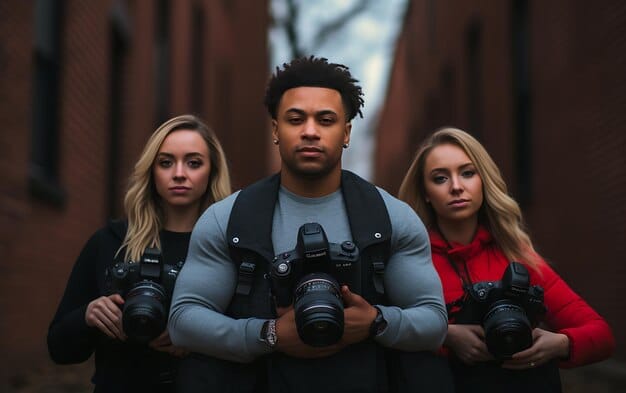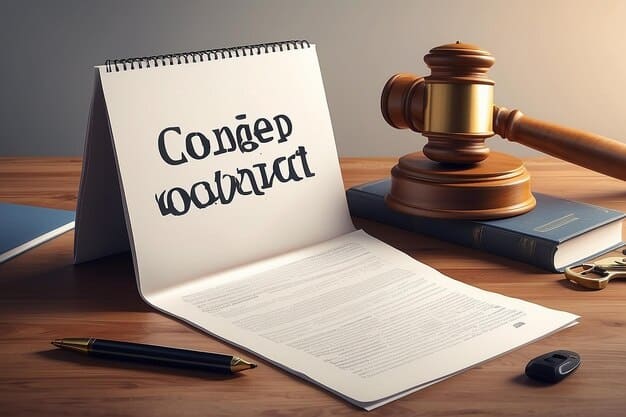Short Film Legal: Copyright, Contracts & Releases for US Filmmakers in 2025

In 2025, US filmmakers creating short films must navigate complex legal considerations including copyright law, talent and location releases, and various contracts to protect their work and avoid potential liabilities.
Creating a short film is an exciting endeavor, but understanding the legal landscape is crucial. Let’s dive into the essential short film legal considerations: copyright, releases, and contracts for US filmmakers in 2025, ensuring your creative vision is protected.
Copyright Essentials for Short Films
Copyright is the cornerstone of protecting your short film. Understanding how it works is vital for every US filmmaker in 2025. Let’s break down the key elements.
Knowing how to protect your work is just as important as the creative process itself.
Understanding Copyright Ownership
Copyright initially belongs to the author(s) of the work. In filmmaking, this can include writers, directors, and composers. Understanding who owns what is the first step.
Securing rights early will save headaches later.
Fair Use and Public Domain
Fair use allows limited use of copyrighted material without permission for purposes like criticism, commentary, news reporting, teaching, scholarship, and research. Public domain materials are not protected by copyright and can be used freely.
Knowing when fair use applies can be complex but beneficial.

- Copyright Registration: Registering your film with the US Copyright Office creates a public record of your claim and allows you to sue for infringement.
- Duration of Copyright: Copyright protection generally lasts for the life of the author plus 70 years. For corporate works, it’s typically 95 years from publication or 120 years from creation, whichever expires first.
- Protecting Your Work: Use copyright notices (© [Year] [Your Name]) and consider watermarking your film online to deter unauthorized use.
Understanding copyright is essential to avoid legal issues and protect your creative work.
Navigating Talent Releases
Talent releases are agreements between filmmakers and actors or other performers, granting permission to use their likeness and performance in your short film. It’s a critical step in ensuring legal compliance.
Without talent releases, you risk potential legal action.
What to Include in a Talent Release
A comprehensive talent release should include the scope of the usage (e.g., specific film, distribution channels), compensation (if any), duration of the agreement, and a waiver of rights.
Clear, specific language is essential in talent releases.
Minors and Talent Releases
When working with minors, you must obtain a release from their parent or legal guardian. Some states have specific requirements for child performers, so research local laws.
Always prioritize the well-being and legal rights of child performers.
Failing to obtain proper talent releases can expose you to legal claims and damage your film’s prospects.
Location Releases: Permission to Film
Securing location releases is essential when filming on private property. These agreements grant you permission to film on a specific location, under agreed-upon terms.
Always obtain permission before filming on private property.
Key Elements of a Location Release
A location release should include the property address, dates and times of filming, specific areas of the property being used, and any restrictions or special conditions. Compensation, if any, should also be clearly stated.
Be precise in your location release to avoid misunderstandings.

Public vs. Private Property
While you generally don’t need a location release to film on public property, you may need permits or licenses depending on local regulations. Research the specific rules of the city or county where you’re filming.
Even on public property, be aware of local filming regulations.
- Respecting Property Owners: Treat property owners with respect and adhere to any specific requests or instructions.
- Insurance Requirements: Many location releases require filmmakers to have liability insurance to cover potential damages to the property.
- Contingency Planning: Have a backup location in case you are unable to secure a location release in time.
Location releases ensure you have the legal right to film on a property and protect you from potential disputes.
Essential Contracts for Filmmakers
Contracts are legally binding agreements that define the rights and obligations of parties involved in your short film. Several types of contracts are essential for filmmakers.
Formal contracts protect all parties involved in the production.
Writer Agreements
If you’re working with a writer, a writer agreement should clearly define the scope of the work, payment terms, ownership of the screenplay, and any other relevant details. This agreement ensures clarity and protects both parties.
A well-drafted writer agreement avoids future disputes.
Director Agreements
Similar to writer agreements, director agreements outline the director’s responsibilities, compensation, creative control, and ownership of the film. It’s crucial to have a clear understanding from the outset.
Director agreements are vital to maintaining creative control.
Crew Agreements
Crew agreements specify the roles, responsibilities, payment, and work conditions for each member of your film crew. These agreements help prevent misunderstandings and ensure a smooth production.
Solid crew agreements foster a professional environment.
Distribution Agreements
If you plan to distribute your short film through a third party, a distribution agreement will outline the terms of the distribution, including the territory, duration, revenue sharing, and marketing responsibilities.
Distribution agreements determine how your film reaches audiences.
Well-defined contracts are essential for protecting your rights and ensuring a smooth production process.
Insurance Coverage for Short Films
Insurance is a critical component of managing risk during your short film production. It protects you against potential liabilities and financial losses.
Don’t overlook the importance of adequate insurance coverage.
Types of Film Insurance
Several types of insurance are relevant for short film productions, including general liability insurance, errors and omissions insurance, workers’ compensation insurance, and equipment insurance.
Each type of insurance covers different potential risks.
General Liability Insurance
General liability insurance protects you against claims of bodily injury or property damage caused by your filming activities. It’s essential for covering accidents that might occur on set.
General liability protects against on-set accidents.
Errors and Omissions (E&O) Insurance
E&O insurance protects you against claims of copyright infringement, defamation, or invasion of privacy. It’s crucial for protecting your film from legal challenges after it’s completed.
E&O insurance safeguards against post-production legal claims.
Workers’ Compensation Insurance
If you have employees, workers’ compensation insurance is typically required by law. It covers medical expenses and lost wages for employees who are injured on the job.
Workers’ compensation is essential for protecting your crew.
Copyright Infringement and How to Avoid It
Copyright infringement occurs when you use copyrighted material without permission or a valid legal exception like fair use. Avoiding infringement is crucial to protect yourself from legal action.
Copyright infringement can lead to costly legal battles.
Due Diligence in Clearing Rights
Before using any third-party material in your short film, such as music, footage, or artwork, conduct thorough due diligence to determine if it’s protected by copyright. If it is, obtain the necessary licenses or permissions.
Always clear the rights to any third-party material.
Using Music in Your Film
Music is a common source of copyright issues. Obtain licenses for any music you use in your film, whether it’s a popular song or background music. Consider using royalty-free music from reputable sources.
Secure music licenses to avoid legal problems.
- Transformative Use: If you’re using copyrighted material in a transformative way, such as parody or satire, you may be able to rely on fair use. However, the application of fair use can be complex and fact-dependent, so seek legal advice if you’re unsure.
- Seeking Legal Advice: When in doubt, consult with an entertainment attorney who can advise you on copyright law and help you navigate any legal issues.
- Documenting Permissions: Keep a record of all licenses and permissions you’ve obtained for the use of copyrighted material in your film.
Understanding and respecting copyright law protects your work and helps you avoid legal disputes.
| Key Aspect | Brief Description |
|---|---|
| ©️ Copyright Protection | Ensures legal ownership and prevents unauthorized use of your film. |
| 🎬 Talent Releases | Secure permissions from actors for their appearance in your film. |
| 📍 Location Releases | Obtain permissions for filming on private properties to avoid legal issues. |
| 📝 Essential Contracts | Formalize agreements with writers, directors, and crew to protect all parties. |
Frequently Asked Questions About Short Film Legalities
▼
Copyright protects original works of authorship, including the screenplay, direction, music, and visual elements of the short film, from unauthorized duplication or distribution.
▼
A talent release is needed anytime a performer appears in your film, granting you the right to use their likeness and performance. It helps prevent potential legal claims.
▼
While you typically don’t need a release for public places, you might need permits depending on local rules. Always check with the city or county about filming regulations.
▼
General liability insurance, errors and omissions (E&O) insurance, and workers’ compensation insurance are highly recommended to protect against potential accidents or legal claims during production and distribution.
▼
Always obtain licenses for third-party materials such as music or footage and conduct due diligence to confirm their copyright status. Using royalty-free resources and original content minimizes the risk.
Conclusion
Navigating the legalities of short filmmaking can seem daunting, but understanding short film legal considerations: copyright, releases, and contracts for US filmmakers in 2025 is crucial for protecting your creative work and avoiding potential legal pitfalls. Securing the right agreements and insurance will set you up for success.





